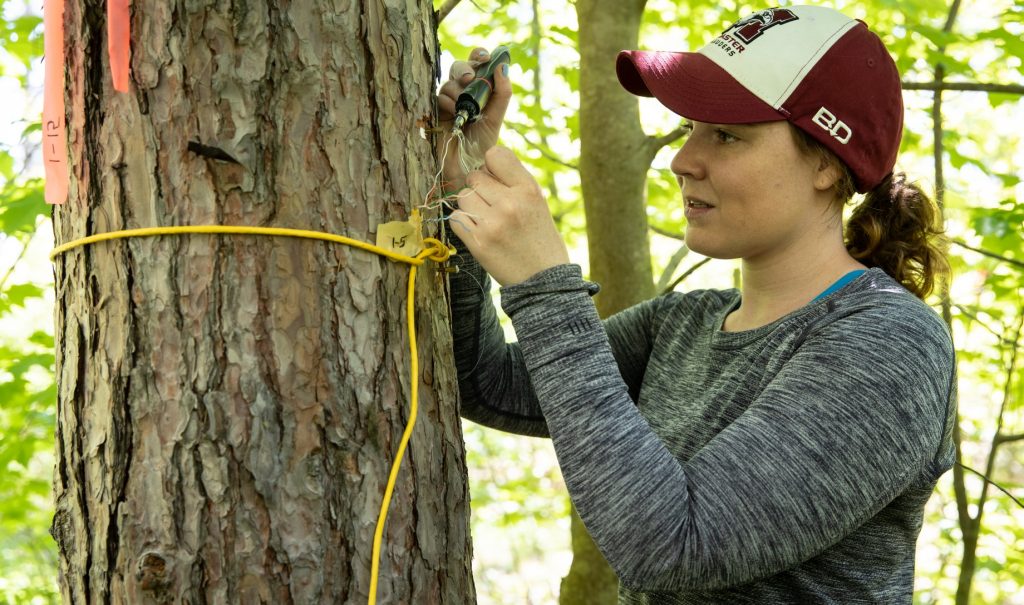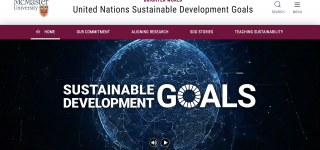Research with a global impact: New site focuses on UN goals

PhD student Alanna Bodo has built more than 120 sensors to measure how trees breathe. A new website focused on the United Nations Sustainable Development Goals showcases impactful research at McMaster that aligns with the goals and offers a toolkit for other institutions and researchers.
February 8, 2021
After two years of ranking among the best universities in the world for global impact that advances the United Nations Sustainable Development Goals (SDGs), McMaster has created a website that offers a toolkit for other institutions and researchers.

The SDGs are a call to action to end poverty and hunger, protect the planet and help people live healthy lives in peace, equity and prosperity by the year 2030.
The new site showcases impactful research at McMaster that aligns with these goals and features a detailed section sharing best practices on aligning academic research with the SDGs.
“At McMaster, we recognize our responsibility to address the SDGs as we work together – across disciplines and faculties, locally and globally – to create a healthier, brighter world,” says President David Farrar.
Universities have a key role to play in educating current and future students, as well as the general public, on the 2030 Agenda for Sustainable Development, agrees Andrea Baumann, head of the university’s Global Health office, who received a grant for this project from the federal government’s Employment and Social Development Canada (ESDC): Sustainable Development Goals Funding Program.
Titled “Sharing sustainability: A how-to for higher education,” the website project highlights McMaster’s deep commitment to the 17 development goals.
“Much of the research taking place at McMaster aligns directly with the development goals, and I think we have an opportunity to demonstrate thought leadership in this arena, having ranked among the top 20 institutions globally for deep commitment to the SDGs,” Baumann says.
McMaster has placed among the top 20 universities globally by the Times Higher Education Impact Rankings for two years running for its deep commitment to achieving many of the Sustainable Development Goals, including good health and well-being, decent work and economic growth, building sustainable cities and communities, achieving gender equity and revitalizing global partnerships.
“Our aim with this project has been to create a toolkit that includes leading practices and strategies, showcases the work that is happening across disciplines, and serves as a resource for other institutions and researchers interested in a global framework to tackle the most pressing challenges the world is facing.” — Andrea Baumann.
The website also has a report that shows — by example — hundreds of ways in which university communities can drive change and impact that aligns with the SDGs through initiatives in research, teaching, governance and community engagement.
“As a leading business school, we have the unique opportunity to develop future leaders and engage industry partners who are committed to having a global impact,” says Leonard Waverman, Dean of the DeGroote School of Business and Co-Chair of the university’s Rankings Committee.
“We’re proud of McMaster’s position in the world rankings, which reflects our collective focus on innovative solutions that are both interdisciplinary and global.”
The website includes profiles of 17 researchers and their work — each connected to one of the SDGs.
“The SDGs can be helpful for us as researchers in framing our research questions,” says Bonny Ibhawoh, director of McMaster’s Centre for Human Rights and Restorative Justice. “In whatever field you’re working, whether it’s health or education or justice or climate change, there is an SDG that speaks to the urgency of that development goal.”
“The SDGs are a roadmap that shows 17 pathways that researchers can take to help make the world better,” says cancer biologist Juliet Daniel, whose research focuses on a deadly form of breast cancer that disproportionately affects women of colour.
“Our responsibility as researchers really is just that: To make the world a better and brighter place.”


